Folks,
Well, Presidential debate is no joker......It must be based on facts more specifically now in modern age, people want to hear the Truth. When in the debate, what come out is a tank full of lies and falsehood attacks people wonder where the type of leadership of lies is headed to………Which is why, Lies must fiercely be exposed and be replace with facts. Statements made on lies in public has never won logistic theories of any type in world history. It will be the first one of its kind people.......
Mitt Romney and Team must tell people his proposed theory statement of fact.....His Vice Paul Ryan must clean the mess of lies and stand on fact. Joe Biden should not let any chances slide.......It is tomorrow we shall see if Lies will stand against the Truth.......
Otherwise, we now know the character in the TANGO....... and Joe Biden MUST prepare to Tango and challenge those lies with a jab of good dozes…….and rest the case where it be-long before President Obama resume on his second debate.
Yeah..........Joe Biden and President Obama must stay and remain on the aggressive attack to bring those tons of lies down to level on the ground. Substances of Statement of Facts of good reports on job situation, housing, including list of achievements are clear facts that contributed to steady the economy from the brink of the collapse…….Recovery Act Plan is progressively picking up, to do list of next course of action is grounded to take off …….
If you are dealing with a Rogue, dont you know what to expect, you either ran you let them hijack your Plan, or get down to to face those rogue and Tango them at full blast......???
Boehner just hit the panic button. Yesterday, his Super PAC allies announced that they're dropping $13.5 million to defeat our Democratic candidates in too-close-to-call races.
President Obama's base must get fully charged with upper cuts. This is no fun. Tomorrow, the Truth must shine and things must go up. The Lies must be brought down with a heavy thud. Joe Biden must prepare with hard blows and at the next, President Obama's debate must break the roof.
At last debate, report card Graded Mitt Romney performances based on lies are without substantives frame work to state and support his Proposed Plan where still their proposed plans sitting on mark-time to hijack any window of opportunity; which is why, evidential points for substances why Romney stole the shore still lingers in doubt and subsequently, is still questionable ......Still the question remain, where is Romney's Plan with Tax Return for 12 years……???......If Mitt Romney is not hiding who the True Mitt Romney is, then, he should declare and lay bare the truth………or else, let the music begin…….
Why would Romney not tell the truth about what he'd do as President? Because his real plans would hurt the middle class.
Should Rogues be allowed to win on lies or perfect in cheating against the Truth without supportive of facts???......... If that is let, then we are all doomed......... Where shall this world be if Lies begin to dictate over the Truth and Reality is shadowed ????
Mitt Romney Isn't Telling the Truth Published on Oct 5, 2012 by BarackObamadotcom Share this: http://OFA.BO/u6pMbg Daily snapshot: Fact-checkedBy on October 4, 2012
Biden to play 'hardball' in debate against RyanBy | Associated Press – 8 mins agoWASHINGTON (AP) — Four years ago, Joe Biden was careful not to appear overly aggressive in the vice presidential debate with Sarah Palin, then a newcomer to the national stage. But Biden is less concerned about coming across like a bully as he prepares to debate Rep. Paul Ryan on Thursday. Former Michigan Gov. Jennifer Granholm says Vice President Biden will play "more hardball" against Ryan, a 14-year House veteran and the top Republican budget writer. Vice presidential debates usually don't matter as much as presidential face-offs. But both parties say the stakes for Thursday's clash in Kentucky are higher because of President Barack Obama's lackluster performance in his debate last week against Republican challenger Mitt Romney. Romney's performance helped him cut into Obama's lead in key battleground states. Mitt Romney vs. the truthBy on October 5, 2012 At the debate in Denver, Mitt Romney stretched the truth about his plans for the country time and again. On topics ranging from his tax proposal to his plan for Americans with pre-existing conditions, Romney either misrepresented or refused to provide details about his own plans—because his real plans would hurt the middle class. Watch this video and share it with your friends and family. Fact check: Romney would jeopardize education opportunities for students by cutting Pell GrantsBy on October 5, 2012
"If you want to be president, you owe the American people the truth."—President Obama At the debate last night, Mitt Romney promised to repeal Obamacare—but he didn't lay out a single, specific idea to protect millions of Americans who are already benefiting from the law, or the millions more who will gain coverage in the years to come. And nowhere was his evasiveness more clear or more disappointing than when it came to the issue of covering people with pre-existing conditions. Half of Americans under age 65 have a pre-existing health condition, and making sure they have access to health insurance was one of the President's top priorities with Obamacare. Romney has pledged to do away with the comprehensive protections the health care law provides—saying he would repeal Obamacare and "kill it dead" on his first day in office. Last night, he stood on the debate stage and told the country, "I do have a plan that deals with people with pre-existing conditions." But he simply wasn't telling the truth. The plan he's talking about only protects people who have been "continuously covered," meaning that they haven't had any gaps in health insurance coverage. As Romney explained in July, "People who have a pre-existing condition, who've been insured in the past are able to get insurance in the future." Immediately after the debate, Romney advisor Eric Fehrnstrom emphasized the same thing, saying, "What Governor Romney has said is for those with continuous coverage, he would continue to make sure that they receive their coverage." Since Romney's plan only helps people who already have health insurance, it leaves a lot of people out. In fact, 89 million Americans have had a gap in health care coverage. That means Romney's plan does nothing to help them get coverage or protect them if they develop arthritis, survive breast cancer, or discover they have high blood pressure. But there's another—even bigger—problem with the plan Mitt Romney is trying to sell the country: It's already the law. Since 1996, federal law has protected people with pre-existing conditions if they have already have insurance. So not only does his so-called "plan" leave 89 million people at risk, it's also not even a change from the status quo. President Obama fought to reform the health care system because he believes Americans deserve affordable health care—and he knew the old system wasn't working. Thanks to Obamacare, insurance companies won't be able to discriminate based on pre-existing conditions, insurers will be barred from charging women higher premiums than they charge men, and more than 3 million young adults gained health care coverage because of the provision allowing young adults under 26 to remain on their parents' insurance. By repealing Obamacare entirely, Romney would eliminate all these benefits and once again subject middle-class families to the whims of insurance companies' bottom lines.
Debate fact check: The truth about President Obama's budget and middle class taxesBy on October 5, 2012
Governor Romney has a problem: There is only one way to pay for his $5 trillion in tax cuts for the wealthy, and that's higher middle class taxes. Since Governor Romney won't release his own plan, he is desperately attacking the President's plan to distract voters. Yesterday, he claimed that President Obama's plan would raise middle class taxes by $4,000. What he didn't mention was that, by the same math, the middle class would pay $5,300 unless we act on the President's deficit plan. In other words, the study—if taken at face value—shows the President's budget is actually a $1,300 tax cut. The President has put forward a plan that reduces the deficit by over $4 trillion over the next decade without raising taxes on any middle-class families. And it has nothing to do with how the President has proposed to address our deficit challenges—which includes a combination of spending cuts and additional revenues from the wealthiest Americans. Instead, the American Enterprise Institute paper attempts to illustrate the costs of deficits by asking how much interest on the deficit would cost taxpayers if it was all paid for by higher taxes. It's all on page 15 of the report. If you look at the middle-class families Romney is describing—those earning between $100,000 and $200,000—you'll see that their current "tax burden" based on projected deficits over the next decade is $3,743. If the President's deficit reduction plan were enacted, that number would decline to $2,453. That's a nearly $1,300 tax cut. The Romney campaign comes to their conclusion by attributing the costs of the deficits in the 14 years between 2009 and 2022 to the President—even though the deficits in President Obama's first term were largely due to prior policies and the recession, and his plan would cut the deficit in half by 2014, according to the independent Congressional Budget Office. Of course, if Romney did the same misleading math he applies to the President in his ad to his own budget plan, he'd find that he is "raising middle class taxes" even more. Using Romney's own math, unless he fully eliminated the deficit on the day he took office—a step that he himself admits would devastate the economy—he would be "raising middle class taxes." And since Romney has proposed $5 trillion in tax cuts and $2 trillion in added defense spending that he would need to pay for before he makes even a dollar of progress towards deficit reduction, his plan would show thousands of dollars in tax increases himself. But here's the thing: We don't need to distort hypothetical studies to show that Romney's tax plan would raise middle class taxes. Romney just needs to ask his own advisors who have made it clear that the only way his tax plan add up is by raising taxes on the very taxpayers he is talking about in his ad.
Debate fact check: The President's investments support a clean energy industry that Romney would gutBy on October 5, 2012 "If you want to be president, you owe the American people the truth."—President Obama Among the numerous false attacks Mitt Romney launched last night was his claim that the President invested $90 billion in green energy businesses of which "about half" have failed. But as the Washington Post notes, this claim comes "nowhere near" the truth. The $90 billion was a part of the American Recovery and Reinvestment Act and was a down payment toward our goals of reducing our dependence on foreign oil and rebuilding the economy in the short- and long-term. As CNN points out, not even half of the Recovery Act funding for clean energy went directly to green businesses. In fact, some of the major investments made by the Recovery Act included funding the weatherization of hundreds of thousands of low-income homes and the clean-up of hundreds of miles of land used for nuclear testing. A piece of that funding was the Obama administration's investments through the Department of Energy's loan program which included grants, loan guarantees, and loans to the clean energy industry, and are expected to support tens of thousands of jobs across the country. These investments have supported one of the world's largest wind farms in eastern Oregon, solar power plants in Arizona, and Ford's production of fuel-efficient cars. And as CNN notes, "most of the large projects that benefited from the Department of Energy loan program remain in operation—contrary to Romney's assertion." In fact, companies that filed for bankruptcy received just 4%of the funding awarded to clean energy companies through the Energy Department's loan program. Romney coupled this attack with another demonstrably misleading claim: "Now, I like green energy as well," he said. But his rhetoric doesn't match his actual energy plan, which would cede the clean energy economy to China. His "view that the government should cut off aid to renewable energy"—such as the wind production tax credit—won't help us develop these new sources. He even suggested that wind and solar are "imaginary" sources of energy. In fact, Romney zeroes out federal incentives for solar, wind, and renewable businesses in his energy plan that was developed in consultation with oil and gas executives. Perhaps that is why he'll maintain the $4 billion in taxpayer subsidies for Big Oil. Learn more about the clear choice Americans have on moving the country towards an energy independent future here.
Debate fact check: Romney would end Medicare as we know itBy on October 5, 2012 "If you want to be president, you owe the American people the truth."—President Obama At the first debate, Mitt Romney repeated the false claim that President Obama made $716 billion in cuts to Medicare and has no plan to protect the program. This falsehood has been thoroughly and repeatedly debunked by independent fact-checkers—the $716 billion doesn't cut benefits and doesn't harm beneficiaries. The facts show that Obamacare reduces the rate of growth in Medicare spending by eliminating waste and inefficiencies, adding an additional eight years of solvency to the program while guaranteeing that every benefit remains in place. Mitt Romney, on the other hand, admitted once again that he would turn Medicare into a voucher system, which could raise retirees' annual costs by more than $6,000 a year based on an analysis of his current plan. Romney's categorically false attack cannot hide the fact that he and Paul Ryan would force seniors to pay more out of pocket for their Medicare benefits. And in addition to increasing beneficiaries' costs, Romney's plan could actually bankrupt Medicare by 2016. The AARP endorsed Obamacare because it extends the life of Medicare by nearly a decade by reducing unnecessary insurance company subsidies and rooting out waste and fraud. President Obama's reforms target wasteful programs and ensure that taxpayer money is efficiently filtered back into the health care system, allowing seniors to get preventive care without copays and pay less out of pocket for prescription drugs. In fact, by 2020, the "doughnut hole"—or coverage gap in Medicare Part D—will be eliminated. Mitt Romney is resorting to such blatant distortions because he knows his plan to voucherize Medicare is extremely unpopular with seniors—after all, who wants to see their benefits diminish while their health care costs skyrocket?
Bill Clinton works Las Vegas crowd, mocking Mitt RomneySpeaking on President Obama's behalf, he characterizes the Republican's moderate talk during the debate as hypocritical in hopes of holding on to Nevada's electoral votes.
LAS VEGAS — Nearly a week after President Obama stopped his campaign's momentum with a lackluster debate performance, former President Clinton sought Tuesday to help him recover by offering a withering new critique of Mitt Romney. "I had a different reaction to that first debate than a lot of people did," Clinton told nearly 2,000 supporters at a campaign rally for Obama and other Democrats. "I thought, 'Wow, here's old moderate Mitt. Where ya been, boy?'" Clinton compared Romney's performance in Denver to a sales job at the Boston private equity firm where the Republican presidential nominee made his personal fortune. "It was like one of these Bain Capital deals, you know, where he's the closer," Clinton said. "So he shows up, doesn't really know much about the deal and says, 'Tell me what I'm supposed to say to close.' The problem with this deal is the deal was made by severe conservative Mitt," alluding to Romney's description of himself in February as having been a "severely conservative" governor in Massachusetts. A few days before the debate, Clinton added, advisors had urged Romney to recast himself as a moderate. With a mocking tone that drew hoots of laughter, Clinton imitated Romney saying, "I don't have that tax plan I had for the last two years. Are you going to believe me or your lyin' eyes here?" Clinton, who electrified Democrats in September with a rousing testimonial for Obama at the party's national convention, did not directly criticize the president. But he told the crowd what Obama might have told Romney as the Republican sought to reposition himself with a centrist's tone on healthcare, education and other issues. "I could have used you in that healthcare debate when I was trying to enact a national version of the Massachusetts law, and you were all of a sudden condemning what you had been for," Clinton said. "And I miss you." Clinton's appearance for Obama in Nevada was the latest in a string of events he has held for the president's reelection. Clinton has also campaigned in Florida and New Hampshire, and has helped Obama raise money. Obama has held a consistent, if narrow, lead in Nevada polls for months. But Romney's gains in national polls since the debate suggest the race for Nevada's six electoral votes may have tightened. Clinton's approach was often comical at the outdoor rally at a Las Vegas nature preserve a few miles from the Strip. He ridiculed Republicans for the reaction by some to Friday's drop in the nation's unemployment rate to below 8%. "I was kind of embarrassed for them, weren't you?" Clinton asked. "Oh, they were whining and moaning, 'It's a grand conspiracy; oh, they cooked the numbers.'" Ryan Erwin, a senior advisor to the Romney campaign in Nevada, recalled that the former president once described Romney's business record as "sterling." Erwin also said Nevada's ailing economy remained a major hindrance to Obama. "If you drive through any neighborhood in Nevada, south or north, you're going to find vacant homes, or homes for sale on short sale," he said. Nevada's 12.1% unemployment rate is the highest of any state. It peaked two years ago at 14%, then slid to 11.6% in June before spiking upward again. Romney has another distinct advantage in Nevada: Widespread support among the state's large Mormon population. A wild card, though, will be libertarians who backed Rep. Ron Paul for the Republican nomination, said Michael Green, a history professor at the College of Southern Nevada. In Nevada, some of them could opt for Libertarian candidate Gary Johnson, cutting into Romney's support. "If the race is really tight, that might matter," Green said. Obama is favored overwhelmingly by Nevada's growing ranks of Latinos. And the Culinary Workers Union, a major force for Democratic campaigns in Nevada, is backing him. Clinton's rally at the Springs Preserve was plugged in the local media for days. Among those in the crowd was Darlene Love Smith, 49, a Las Vegas bus driver on disability. "I've always loved Clinton," she said. "He's down to earth, and he says things like he's out for the people — and I believe that he is." michael.finnegan@latimes.com John Boehner, DOMA Defender, Campaigns For Openly Gay GOP Candidate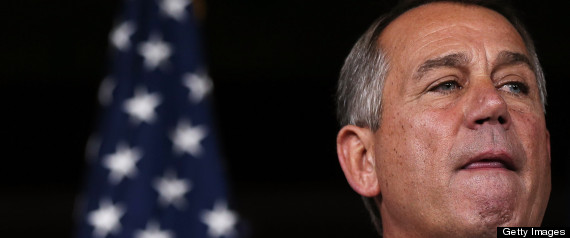 House Speaker John Boehner (R-Ohio), an opponent of gay rights, spent the morning of Tuesday Oct. 9 stumping for an openly gay Republican candidate. WASHINGTON -- House Speaker John Boehner (R-Ohio) has long opposed gay rights, from his opposition to repealing "don't ask, don't tell" to his vote against the Employment Non-Discrimination Act to his decision to defend the Defense of Marriage Act in court to the tune of $1.5 million in taxpayer dollars. But when it comes to the prospect of ousting a House Democrat in favor of a Republican, Boehner seems willing to overlook that record. Boehner spent Tuesday morning raising money for Republican candidate Richard Tisei, who is openly gay and supports same-sex marriage. Tisei, who is running against Rep. John Tierney (D-Mass.), seemed to indirectly address the fact that Boehner opposes gay rights in a statement ahead of their joint breakfast event in Boston. "The Speaker understands that he and I do not agree on absolutely everything, and that I will often be a voice of independent leadership -- particularly if it is not in the interests of the Sixth District," Tisei said. "I look forward to working with the Speaker as a voice of reason and moderation in Congress to help solve our nation's problems." Tisei campaign spokeswoman Jennifer Drogus declined to respond more specifically when asked about Tisei's take on Boehner's ongoing defense of DOMA. Boehner, along with House Majority Leader Eric Cantor (R-Va.) and House Majority Whip Kevin McCarthy (R-Calif.), decided to defend DOMA in court after Attorney General Eric Holder said in February 2011 that he would no longer defend the law because he had determined it to be unconstitutional. Boehner campaign spokesman Cory Fritz also demurred when asked to explain how Boehner squares his support for Tisei with his views on gay rights. "While they don't agree on every issue, Richard and the Speaker respect one another, and we expect Richard will be a strong, independent voice for his Massachusetts constituents that want a new approach to help create jobs and prosperity," Fritz said in a statement. U.S. lawmakers seek to block China Huawei, ZTE U.S. inroadsBy Jim Wolf | Reuters – Mon, Oct 8, 2012WASHINGTON (Reuters) - U.S. telecommunications operators should not do business with China's top network equipment makers because potential Chinese state influence on the companies poses a security threat, the U.S. House of Representatives Intelligence Committee said in a report on Monday. The report follows an 11-month investigation by the committee into Huawei Technologies Co Ltd and its smaller rival, ZTE Corp. The companies have been fighting an uphill battle to overcome U.S. lawmakers' suspicions and expand in the United States after becoming key players in the worldwide market. The House Intelligence Committee's bipartisan concerns are bound to set back the companies' U.S. prospects and may also lead to new strains in trade ties between the United States and China, the world's two biggest economies. Committee Chairman Mike Rogers, at a press conference to release the report, said companies that had used Huawei equipment had reported "numerous allegations" of unexpected behavior, including routers supposedly sending large data packs to China late at night. The panel cited what it called long-term security risks supposedly linked with the companies' equipment and services. It did not provide any hard evidence to back up its concerns, at least not in the unclassified version of the report. Rogers, a Michigan Republican who is a former FBI agent, said lawmakers' concerns had been heightened by what he and the panel's top Democrat, C.A. Ruppersberger of Maryland, described as the companies' lack of full cooperation with the investigation. If the committee's warnings about doing business with Huawei and ZTE prompt the Chinese government to get out of the business of cyber espionage, a growing U.S. concern, "then that's great," he added. The committee recommended that the Committee on Foreign Investment in the United States, an inter-agency group that evaluates the national security risks of foreign investments, should block any deals involving Huawei or ZTE. Government contractors and private-sector companies should seek other vendors for their network equipment, the panel said. Rogers, responding to a question at the press conference, stopped short of urging a U.S. boycott of mobile phones and other handheld devices made by Huawei and ZTE. The panel's warning pertains only to devices that involve processing of data on a large scale, he said, not Huawei- and ZTE-made mobile phones. Employee-owned Huawei is the world's second-biggest maker of routers, switches and other telecommunications equipment after Sweden's Ericsson. ZTE ranks fifth. The panel said it had received credible allegations suggesting Huawei may be guilty of bribery and corruption, discriminatory behavior and copyright infringement. Such allegations will be referred to the Justice Department and Department of Homeland Security for investigation, the panel said. A spokesman for the Justice Department, Dean Boyd, declined to comment. 'RUMORS AND SPECULATIONS' The committee's warning comes as Huawei weighs a possible initial public offering, sources said, as part of an effort to overcome suspicions that have all but blocked its U.S. efforts, including business tie-ins. Huawei denounced the findings, which it said "employs many rumors and speculations to prove non-existent accusations." "We have to suspect that the only purpose of such a report is to impede competition and obstruct Chinese (telecom) companies from entering the U.S. market," Huawei said. ZTE, in a newly released copy of a letter to the committee, said it "profoundly disagrees" with allegations that it is directed or controlled by the Chinese government. "ZTE should not be a focus of this investigation to the exclusion of the much larger Western vendors," it said. Zeus Kerravala, a networking equipment analyst at ZK research, said the effect of the congressional probe was to hand the market to Ericsson and Altactel-Lucent because he does not see any U.S. firm able to compete, for instance, with wireless technology. ZTE's Hong Kong-listed shares fell as much as 3.4 percent early on Monday. Huawei's U.S. sales totaled $1.3 billion last year, a small fraction of its worldwide sales of $32.4 billion. Handheld devices accounted for about three-fourths of Huawei sales in the United States last year, including via T-Mobile, AT&T and Sprint. ZTE's U.S. telecom infrastructure equipment sales last year were less than $30 million. In contrast, two of the larger Western vendors alone had combined U.S. sales that topped $14 billion, ZTE has said, alluding to Espoo, Finland-based Nokia Siemens Networks and Paris-based Alcatel Lucent. GLOBAL PLAYERS Huawei and ZTE, which are both based in Shenzhen, China, are rapidly becoming "dominant global players" in the telecommunications market, the report said. It noted that telecoms are intertwined with computerized controls for electric power grids; banking and finance systems; gas, oil and water systems; and rail and shipping. The National Counterintelligence Executive, a U.S. intelligence arm, said in a landmark public report a year ago that "Chinese actors are the world's most active and persistent perpetrators of economic espionage." China has also been a frequent target on the campaign trail, with President Barack Obama and Republican challenger Mitt Romney both saying the United States needs to get tougher on China for alleged abusive trade practices. The committee's report criticized Huawei and ZTE for failing to answer questions or provide documentation regarding their business activities in Iran. In the case of ZTE, the report said the company "consistently declined to comment on recent media reports that ZTE had sold export-controlled items to Iran." Reuters reported in March and April that ZTE had sold banned U.S. computer equipment to Iran's largest telecom firm. ZTE also agreed last year to ship millions of dollars worth of additional U.S. tech products to a unit of the consortium that controls the telecom firm. The Reuters stories have sparked investigations by the Commerce Department and the Federal Bureau of Investigation. In the wake of those allegations, Cisco Systems has ended a longstanding sales partnership with ZTE Corp. "MEANS, OPPORTUNITY, MOTIVE" Huawei and ZTE may not be the only companies that present a risk to U.S. infrastructure, the committee's report said, but they are the two largest Chinese-founded, Chinese-owned companies seeking to market critical network equipment in the United States. Beijing has the "means, opportunity and motive" to use them to its own ends, it added. The report underscores how little return Huawei in particular has gotten from its significant investment in lobbying in Washington after suffering a number of high-profile setbacks. In 2008, Huawei and private equity firm Bain Capital were forced to give up their bid for 3Com Corp after a U.S. panel rejected the deal because of national security concerns. Then in 2011, the company was forced to relinquish plans to buy some assets from U.S. server technology firm 3Leaf after the Committee on Foreign Investment mandated that Huawei divest certain parts of the deal. The company has brought on seven firms registered to lobby U.S. lawmakers, including APCO, Doyce Boesch and Fleishman-Hillard, according to forms filed under the lobbying disclosure act. That is up from four firms in 2011, two in 2010 and one in 2009. (Additional reporting by Chyen Yee Lee, Diane Bartz, Steve Stecklow and Aruna Viswanatha; Editing by John Wallace and Leslie Adler) North Korea says its rockets can hit U.S. mainlandReuters – 19 hrs agoSEOUL (Reuters) - North Korea has rockets that can hit the U.S. mainland, it said on Tuesday, two days after South Korea struck a deal with the United States to extend the range of its ballistic missiles. North and South Korea have been technically at war since their 1950-53 conflict ended in a truce, not a peace treaty, and regional powers have for years been trying to rein in North Korea's nuclear weapons program. Reclusive North Korea is believed to be developing a long-range missile with a range of 6,700 km (4,160) miles) or more aimed at hitting the United States, but two recent rocket tests failed. Its neighbors fear North Korea is using rocket launches to perfect technology to build a missile capable of delivering a nuclear warhead to the United States. North Korea's National Defence Commission said in a statement that the country was prepared to counter any U.S. military threats, its KCNA news agency said. "We do not hide (the fact) that the revolutionary armed forces ... including the strategic rocket forces are keeping within the scope of strike not only the bases of the puppet forces and the U.S. imperialist aggression forces' bases in the inviolable land of Korea, but also Japan, Guam and the U.S. mainland," KCNA said. The U.S. State Department declined to discuss whether it believed North Korea's new claims on missile range, saying this was an intelligence issue. But it noted that North Korea is bound by U.N. Security Council resolutions to suspend all activities related to ballistic missile programs. "Certainly rather than bragging about its missile capability, they ought to be feeding their own people," State Department spokeswoman Victoria Nuland said, adding that "threats or provocations" by North Korea would only undermine its efforts to seek more engagement with the international community. South Korea on Sunday unveiled an agreement with the United States that extends the range of its ballistic missiles by more than twice its current limit to 800 km (497 miles) as a deterrent against North Korea. North Korea is under heavy U.N. sanctions that have cut off its previously lucrative arms trade and further isolated the state after its failed 2009 missile test drew sharp rebukes, even from its one major ally, China. The United States has denied it has any intention to strike North Korea. It has more than 20,000 troops stationed in South Korea in defense of its ally against North Korea. In April, under its new leader Kim Jong-un, North Korea again launched a rocket that flew just a few minutes covering a little over 100 km (60 miles) before blowing up over the sea between South Korea and China. (Reporting by Jack Kim; Additional reporting by Andrew Quinn in Washington; Editing by Nick Macfie and Will Dunham) |
Karibu Jukwaa la www.mwanabidii.com
Pata nafasi mpya za Kazi www.kazibongo.blogspot.com
Blogu ya Habari na Picha www.patahabari.blogspot.com
Kujiondoa Tuma Email kwenda
wanabidii+unsubscribe@googlegroups.com Utapata Email ya kudhibitisha ukishatuma
Disclaimer:
Everyone posting to this Forum bears the sole responsibility for any legal consequences of his or her postings, and hence statements and facts must be presented responsibly. Your continued membership signifies that you agree to this disclaimer and pledge to abide by our Rules and Guidelines.
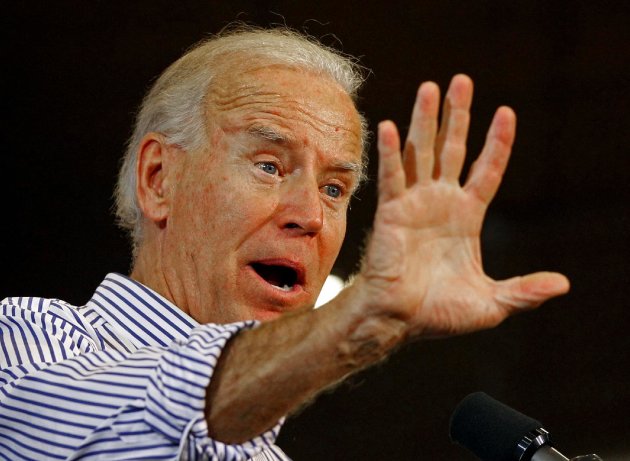
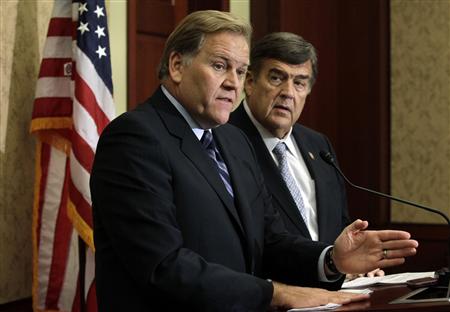
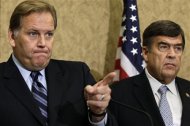

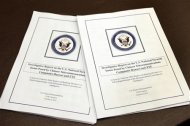



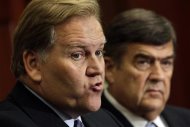
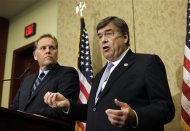
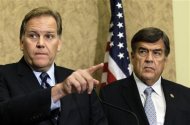

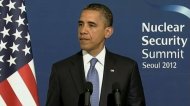


0 comments:
Post a Comment